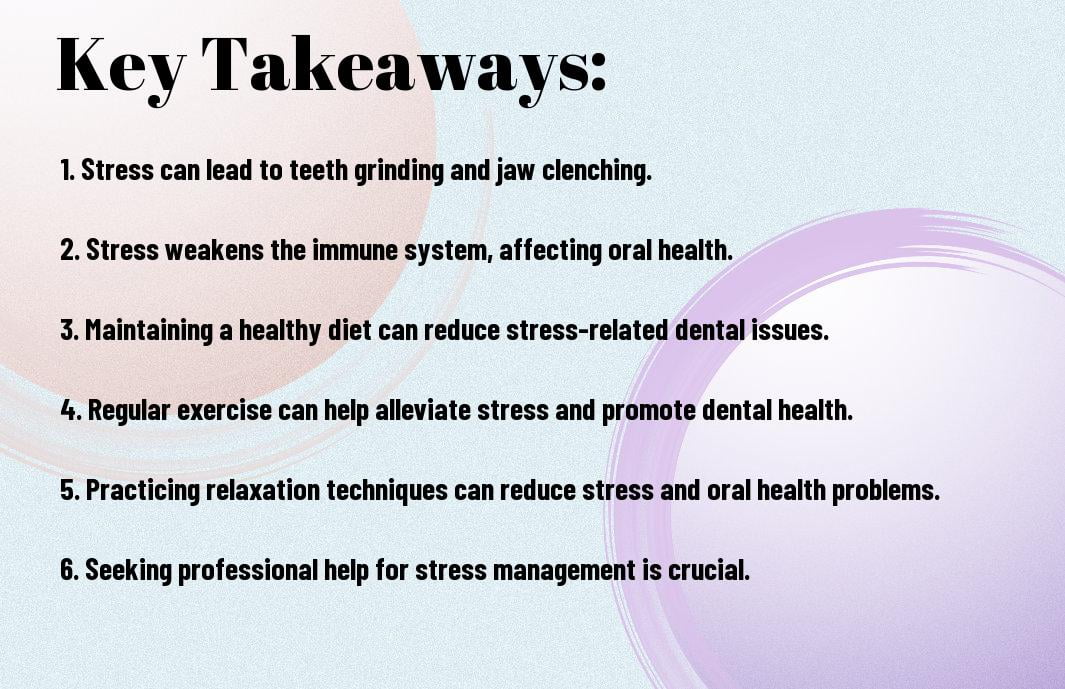Have you ever considered how stress could be affecting your dental health? Stress can have a significant impact on your teeth and gums, leading to a range of oral health issues. From teeth grinding and jaw clenching to poor oral hygiene habits, the effects of stress on your dental health can be incredibly damaging. However, there are various ways in which you can manage and mitigate the impact of stress on your oral health. In this blog post, we will explore the connection between stress and dental health, as well as provide you with practical tips and strategies to help you protect your smile from the harmful effects of stress. Understanding how stress can impact your dental health is the first step towards maintaining a healthy, happy smile.
Key Takeaways:
- Stress can have a significant impact on dental health: Chronic stress can lead to teeth grinding, jaw clenching, and an increase in the production of plaque and bacteria in the mouth, resulting in a higher risk of developing gum disease and cavities.
- Managing stress is crucial for maintaining good dental health: Utilizing stress management techniques such as exercise, meditation, deep breathing, and seeking professional help can significantly reduce the negative impact of stress on dental health.
- Regular dental check-ups and good oral hygiene practices are essential: Visiting the dentist for regular check-ups, maintaining a proper oral hygiene routine, and adopting healthy lifestyle habits can aid in minimizing the effects that stress has on dental health.
The Impact of Stress on Dental Health
The effects of stress on your oral health can be significant. Stress can lead to a variety of oral health issues, ranging from bruxism (teeth grinding) to gum disease. If you’re interested in learning more about how stress affects your dental health, you can check out this detailed article on How Does Stress Affect Your Oral Health?
The Biological Response to Stress and Oral Health
When you experience stress, your body releases a hormone called cortisol, which can increase inflammation throughout your body, including in your gums. This can lead to an increased risk of gum disease, as well as delayed healing after dental procedures. Additionally, stress can weaken your immune system, making you more susceptible to oral infections and diseases.
Stress-Related Dental Conditions
Stress can also contribute to bruxism, which is the clenching or grinding of teeth. This can lead to worn enamel, tooth sensitivity, and even tooth fractures. Additionally, stress can lead to poor oral hygiene habits, such as neglecting to brush and floss regularly, which can increase your risk of cavities and gum disease. You may also find yourself turning to unhealthy coping mechanisms, such as smoking or consuming sugary foods, which can further harm your dental health.
By understanding the impact of stress on dental health and the biological response to stress, you can better recognize the importance of managing your stress levels for the sake of your oral health. It’s crucial to find healthy outlets for stress, such as exercise, meditation, or seeking professional help when needed. Keep in mind that managing stress not only benefits your mental and physical well-being but also helps maintain strong, healthy teeth and gums for a lifetime.
Diagnosis and Evaluation
Your overall dental health is influenced by a multitude of factors, and stress is one of them. When it comes to the diagnosis and evaluation of stress-related dental issues, it’s important to understand the clinical signs of stress-related dental issues and assess your stress levels and their impact on your oral health. By identifying and addressing these issues, you can take proactive steps to protect your dental health and overall well-being.
Clinical Signs of Stress-Related Dental Issues
Stress can manifest in various ways within the oral cavity, leading to clinical signs such as teeth grinding (bruxism), jaw clenching, canker sores, and gum disease. Bruxism, in particular, can lead to excessive wear and damage to the teeth and an increased risk of developing temporomandibular joint (TMJ) disorders. Additionally, prolonged exposure to stress has been linked to an increased prevalence of canker sores and a weakened immune system, making you more susceptible to oral infections. These signs serve as red flags indicating the need for further evaluation and intervention to address the underlying stress and its impact on dental health.
Assessing Stress Levels and Their Impact on Oral Health
In assessing your stress levels and their impact on your oral health, it’s important to consider the various physical and psychological symptoms that may arise. Chronic stress can contribute to hormonal imbalances and immune system dysregulation, leading to an increased susceptibility to oral infections and delayed healing processes. Furthermore, stress can result in behavioral changes such as poor oral hygiene habits, unhealthy dietary choices, and the neglect of regular dental visits, all of which can significantly impact your oral health. By recognizing these patterns, you can take proactive measures to manage your stress and mitigate its effects on your dental well-being.
Management Strategies for Stress-Related Dental Issues
Despite your best efforts to manage stress, it can still take a toll on your dental health. Fortunately, there are management strategies you can utilize to address stress-related dental issues. These strategies can help you minimize the impact of stress on your oral health and maintain a healthy smile.
Traditional Dental Treatments
If you are experiencing stress-related dental issues such as teeth grinding, jaw clenching, or temporomandibular joint (TMJ) disorder, traditional dental treatments can help alleviate these symptoms. Your dentist may recommend the use of a custom-made night guard to protect your teeth from grinding or clenching during sleep. Additionally, dental procedures such as dental crowns or inlays may be necessary to repair damage caused by these stress-related habits. It’s important to consult with your dentist to determine the most appropriate treatment for your specific dental issues.
Stress Reduction Techniques Beneficial to Oral Health
Implementing stress reduction techniques can have a positive impact on your oral health. Techniques such as meditation, deep breathing exercises, and yoga can help reduce overall stress levels, which in turn can alleviate stress-related dental issues. Incorporating regular physical activity into your routine can also help manage stress and promote better oral health. By practicing these stress reduction techniques, you can lower your risk of developing oral health problems associated with chronic stress.
Prevention and Long-Term Oral Care
Now that you are aware of the impact of stress on your dental health, it is important to focus on prevention and long-term oral care. By taking proactive steps, you can minimize the negative effects of stress on your teeth and gums, and maintain a healthy smile for years to come.
Daily Oral Hygiene Practices
When it comes to managing stress and its impact on your dental health, adopting a consistent daily oral hygiene routine is crucial. Brushing your teeth at least twice a day, flossing regularly, and using mouthwash can help prevent tooth decay, gum disease, and other oral health issues. Additionally, incorporating a balanced diet and limiting sugary and acidic food and drinks can further support your overall oral well-being.
Regular Dental Check-Ups and Communication with Dentists
Regular dental check-ups are essential for monitoring your oral health and addressing any concerns that may arise. By scheduling routine appointments with your dentist, you can stay on top of any potential issues caused by stress, such as bruxism (teeth grinding), TMJ disorders, and oral infections. Moreover, effective communication with your dentist is key. Be sure to inform them of any changes in your oral health, as well as any stress-related symptoms that may be affecting your teeth and gums. This open dialogue can lead to personalized care and tailored treatment plans to address your specific needs.
Conclusion
Considering all points discussed, it is clear that stress can have a significant impact on your dental health. From increased teeth grinding to poor oral hygiene habits, the effects of stress on your teeth and gums should not be overlooked. However, by implementing effective stress management techniques such as exercise, meditation, and seeking professional help, you can better protect your dental health. Additionally, making regular dental appointments and prioritizing self-care can go a long way in preventing stress-related oral health issues. By taking proactive steps to reduce stress and prioritize your dental health, you can improve your overall well-being and enjoy a healthy smile for years to come.
FAQ
Q: What are the effects of stress on dental health?
A: Stress can lead to teeth grinding, jaw clenching, canker sores, and a weakened immune system, making the gums more susceptible to infection.
Q: How does stress contribute to teeth grinding and jaw clenching?
A: Stress can cause an increase in muscle tension, leading to the unconscious habit of grinding or clenching the teeth, which can result in tooth damage and jaw pain.
Q: Can stress impact the health of the gums and mouth?
A: Yes, stress weakens the immune system, making the gums more susceptible to infection and inflammation, which can lead to periodontal disease and other oral health issues.
Q: What are some ways to manage stress to protect dental health?
A: Managing stress through techniques such as meditation, exercise, and seeking support from friends, family, or a therapist can help reduce the impact of stress on dental health.
Q: Are there any specific dental treatments or practices that can help manage the effects of stress on oral health?
A: Yes, dental professionals can provide custom mouthguards to protect teeth from grinding, as well as recommend relaxation techniques and regular dental check-ups to monitor and address any stress-related dental issues.







